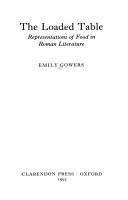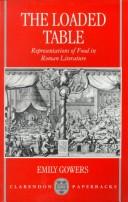| Listing 1 - 8 of 8 |
Sort by
|

ISBN: 0198146957 Year: 1993 Publisher: Oxford Clarendon Press
Abstract | Keywords | Export | Availability | Bookmark
 Loading...
Loading...Choose an application
- Reference Manager
- EndNote
- RefWorks (Direct export to RefWorks)
Aliments dans la littérature --- Dinners and dining in literature --- Eetmalen in de literatuur --- Food in literature --- Repas dans la littérature --- Voedsel in de literatuur --- Dinners and dining --- Food habits --- Latin literature --- Literature and society --- Repas --- Habitudes alimentaires --- Littérature latine --- Littérature et société --- History and criticism --- Histoire et critique --- -Dinners and dining in literature --- -Food in literature --- -Literature and society --- -Food habits in literature --- Gastronomy in literature --- Literature --- Literature and sociology --- Society and literature --- Sociology and literature --- Sociolinguistics --- Roman literature --- Classical literature --- Classical philology --- Latin philology --- Eating --- Food customs --- Foodways --- Human beings --- Habit --- Manners and customs --- Diet --- Nutrition --- Oral habits --- Banquets --- Dining --- Meals --- Caterers and catering --- Entertaining --- Etiquette --- Cooking --- Gastronomy --- Menus --- Table --- Social aspects --- Repas dans la littérature --- Aliments dans la littérature --- Littérature latine --- Littérature et société --- Food habits in literature --- Rome --- Latin literature - History and criticism. --- Food in literature. --- Dinners and dining in literature. --- Literature and society - Rome. --- Dinners and dining - Rome. --- Food habits - Rome.

ISBN: 0198150822 Year: 2003 Publisher: Oxford : Clarendon,
Abstract | Keywords | Export | Availability | Bookmark
 Loading...
Loading...Choose an application
- Reference Manager
- EndNote
- RefWorks (Direct export to RefWorks)

ISBN: 9780198150824 Year: 2010 Publisher: Oxford Clarendon
Abstract | Keywords | Export | Availability | Bookmark
 Loading...
Loading...Choose an application
- Reference Manager
- EndNote
- RefWorks (Direct export to RefWorks)
Book
ISBN: 9780691255989 0691255989 Year: 2024 Publisher: Princeton Princeton University Press
Abstract | Keywords | Export | Availability | Bookmark
 Loading...
Loading...Choose an application
- Reference Manager
- EndNote
- RefWorks (Direct export to RefWorks)
The story of Maecenas and his role in the evolution and continuing legacy of ancient Roman poetry and cultureAn unelected statesman with exceptional powers, a patron of the arts and a luxury-loving friend of the emperor Augustus: Maecenas was one of the most prominent and distinctive personalities of ancient Rome. Yet the traces he left behind are unreliable and tantalizingly scarce. Rather than attempting a conventional biography, Emily Gowers shows in Rome's Patron that it is possible to tell a different story, one about Maecenas's influence, his changing identities and the many narratives attached to him across two millennia.Rome's Patron explores Maecenas's appearances in the central works of Augustan poetry written in his name—Virgil's Georgics, Horace's Odes and Propertius's elegies—and in later works of Latin literature that reassess his influence. For the Roman poets he supported, Maecenas was a mascot of cultural flexibility and innovation, a pioneer of gender fluidity and a bearer of imperial demands who could be exposed as a secret sympathizer with their own values. For those excluded from his circle, he represented either favouritism and indulgence or the lost ideal of a patron in perfect collaboration with the authors he championed.As Gowers shows, Maecenas had and continues to have a unique cachet—in the fantasies that still surround the gardens, buildings and objects so tenuously associated with him; in literature, from Ariosto and Ben Johnson to Phillis Wheatley and W. B. Yeats; and in philanthropy, where his name has been surprisingly adaptable to more democratic forms of patronage.
Benefactors --- Latin literature --- Statesmen --- History and criticism

ISBN: 9780906014301 0906014301 1913701379 Year: 2007 Volume: 31 Publisher: Cambridge Cambridge philological society
Abstract | Keywords | Export | Availability | Bookmark
 Loading...
Loading...Choose an application
- Reference Manager
- EndNote
- RefWorks (Direct export to RefWorks)
Latin poetry --- Lost literature --- Poésie latine --- Oeuvres perdues (Littérature) --- History and criticism. --- Histoire et critique --- Ennius, Quintus --- Criticism and interpretation. --- Ennius, Quintus. --- Poésie latine --- Oeuvres perdues (Littérature) --- History and criticism --- Ennio, Quinto
Book
ISBN: 9780521458511 9780521452205 0521452201 052145851X Year: 2012 Publisher: Cambridge New York : Cambridge University Press,
Abstract | Keywords | Export | Availability | Bookmark
 Loading...
Loading...Choose an application
- Reference Manager
- EndNote
- RefWorks (Direct export to RefWorks)
"Horace's first book of Satires is his debut work, a document of one man's self-fashioning on the cusp between Republic and Empire and a pivotal text in the history of Roman satire. It wrestles with the problem of how to define and assimilate satire and justifies the poet's own position in a suspicious society. The commentary gives full weight to the dense texture of these poems while helping readers interpret their most cryptic aspects and appreciate their technical finesse. The introduction puts Horace in context as late-Republican newcomer and a vital figure in the development of satire and discusses the structure and meaning of Satires I, literary and philosophical influences, style, metre, transmission and Horace's rich afterlife. Each poem is followed by an essay offering overall interpretation. This work is designed for upper-level students and scholars of classics but contains much of interest to specialists in later European literature"-- "Christoph Wieland (1804: 14) once wrote that reading Horace's satires was like going for a walk with him: always stopping for little detours and arriving exactly where you want to be or else right back where you started. My own extended stroll has been as zigzagging and stop-start as any Horatian ramble, spanning two continents, three departments and fifteen years, while the card index gave way to the memory stick and the son who was an infant when the book was commissioned reached adulthood. I find it as hard to know where Horace is going now as when I first encountered him (which is nothing but a compliment). Commentators have many vices, above all myopia. I once asked a colleague to remind me where in Latin literature I had read the old saying about bringing (unwanted) wood to the forest. A flicker of embarrassment before the gentle reply: 'In Horace's tenth satire, I think.' Plagiarism is another occupational hazard. I have ransacked the wisdom-hoards ofmany fellow-commentators, with an unfair bias, some may complain, towards my contemporaries. But the aim of this book is to encourage appreciation of the Satires as literature and collect in pocket form the most penetrating Horatian criticism of the last two decades. A third liability is un-Horatian long-windedness (and a fourth last-minute additions)"--
Verse satire, Latin --- Latin verse satire --- Latin poetry --- Horace. --- Verse satire, Latin. --- Horace. - Satirae. - Liber 1
Book

ISBN: 9781487532642 9781487505776 9781487505776 1487532644 1487532652 1487505779 9781487532659 Year: 2020 Publisher: Toronto
Abstract | Keywords | Export | Availability | Bookmark
 Loading...
Loading...Choose an application
- Reference Manager
- EndNote
- RefWorks (Direct export to RefWorks)
Walking through Elysium stresses the subtle and intricate ways writers across time and space wove Vergil’s underworld in Aeneid 6 into their works. These allusions operate on many levels, from the literary and political to the religious and spiritual. Aeneid 6 reshaped prior philosophical, religious, and poetic traditions of underworld descents, while offering a universalizing account of the spiritual that could accommodate prior as well as emerging religious and philosophical systems. Vergil’s underworld became an archetype, a model flexible enough to be employed across genres, and periods, and among differing cultural and religious contexts. The essays in this volume speak to Vergil’s incorporation of and influence on literary representations of underworlds, souls, afterlives, prophecies, journeys, and spaces, from sacred and profane to wild and civilized, tracing the impact of Vergil’s underworld on authors such as Ovid, Seneca, Statius, Augustine, and Shelley, from Pagan and Christian traditions through Romantic and Spiritualist readings. Walking through Elysium asserts the deep and lasting influence of Vergil’s underworld from the moment of its publication to the present day.
Voyages to the otherworld in literature --- Aeneid --- Augustine --- Christian --- Ovid --- Pagan --- Romantic --- Rome --- Seneca --- Shelley --- Statius --- Vergil --- Virgil --- classical literature --- death --- literary reception --- poetry --- spirituality --- tradition --- underworld --- Vergilius Maro, P. --- Vergilius Maro, Publius --- Vergilius --- Virgile --- Virgilio Máron, Publio --- Virgilius Maro, Publius --- Vergili Maronis, Publius --- Virgilio Marone, P. --- Vergilīĭ --- Vergílio --- Wergiliusz --- Vergilīĭ Maron, P. --- Vergilīĭ Maron, Publīĭ --- Verhiliĭ Maron, P. --- Virgilio --- Virgilīĭ, --- Virgilius Maro, P. --- Virgil Maro, P. --- ווירגיל, --- וירגיליוס, --- ורגיליוס, --- מרו, פובליוס ורגיליוס, --- فرجيل, --- Pseudo-Virgil --- Pseudo Virgilio --- Virgilio Marón, Publio --- Bhārjila --- Influence. --- E-books --- Voyages to the otherworld in literature. --- Aeneid. --- Augustine. --- Christian. --- Ovid. --- Pagan. --- Romantic. --- Rome. --- Seneca. --- Shelley. --- Statius. --- Vergil. --- Virgil. --- classical literature. --- death. --- literary reception. --- poetry. --- spirituality. --- tradition. --- underworld. --- LITERARY CRITICISM / Ancient & Classical. --- Marone, Publio Virgilio --- Aeneis (Virgil) --- Aeneid (Virgil) --- Eneida (Virgil) --- Enéide (Virgil)
Book

ISBN: 3110474174 3110475871 9783110475876 9783110475883 311047588X 9783110474176 9783110472523 311047252X Year: 2016 Publisher: Berlin Boston
Abstract | Keywords | Export | Availability | Bookmark
 Loading...
Loading...Choose an application
- Reference Manager
- EndNote
- RefWorks (Direct export to RefWorks)
The political allegiances of major Roman poets have been notoriously difficult to pin down, in part because they often shift the onus of political interpretation from themselves to their readers. By the same token, it is often difficult to assess their authorial powerplays in the etymologies, puns, anagrams, telestichs, and acronyms that feature prominently in their poetry. It is the premise of this volume that the contexts of composition, performance, and reception play a critical role in constructing poetic voices as either politically favorable or dissenting, and however much the individual scholars in this volume disagree among themselves, their readings try to do justice collectively to poetry’s power to shape political realities. The book is aimed not only at scholars of Roman poetry, politics, and philosophy, but also at those working in later literary and political traditions influenced by Rome's greatest poets.
| Listing 1 - 8 of 8 |
Sort by
|

 Search
Search Feedback
Feedback About UniCat
About UniCat  Help
Help News
News